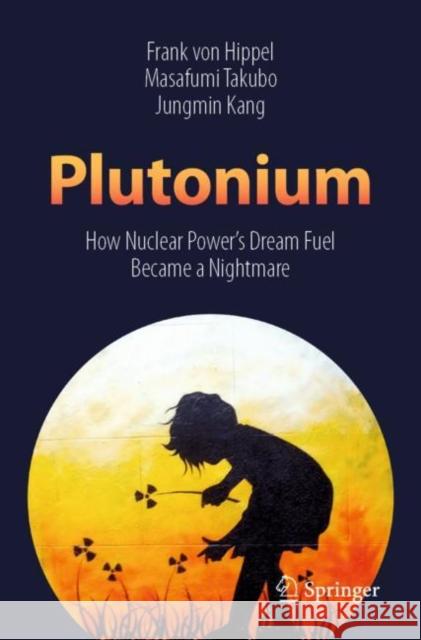Plutonium: How Nuclear Power's Dream Fuel Became a Nightmare » książka



Plutonium: How Nuclear Power's Dream Fuel Became a Nightmare
ISBN-13: 9789811399039 / Angielski / Miękka / 2021 / 177 str.
Plutonium: How Nuclear Power's Dream Fuel Became a Nightmare
ISBN-13: 9789811399039 / Angielski / Miękka / 2021 / 177 str.
(netto: 107,31 VAT: 5%)
Najniższa cena z 30 dni: 107,92
ok. 16-18 dni roboczych.
Darmowa dostawa!
"This book is highly recommended. The entire remarkable story of plutonium is told with crystal clarity and detailed scholarship, fully referenced with helpful end notes." (Gordon Edwards, Peace Magazine, Vol. 36 (3), 2020)
OVERVIEW
1. Overview
Dreams of plutonium breeder reactors
Downsides of breedersMuch more uranium found and demand growth much lower than projections
Reprocessing spent power-reactor fuel
A wake-up call from India’s nuclear test
Plutonium fuel for light-water reactors
Reprocessing for radioactive-waste management?
The nightmares
THE DREAM
2. The dream: a future powered by plutonium
Dual-purpose reactors
How plutonium is made
Light-water reactors and uranium enrichment
Plutonium breeder reactors
THE NIGHTMARES
3. Civilian plutonium separation and nuclear-weapon proliferation
Nuclear-weapon proliferationThe wake-up call of Smiling Buddha
The Carter administration’s review of the US breeder-reactor program
Electricity consumption growth slows and nuclear power stalls
Fading of the breeder dream
Legacies of the failed breeder-reactor dream
4. Continuation of plutonium separation without breeder reactors
France: Recycling plutonium in light-water reactors
United Kingdom: A reprocessing program finally winding down
Japan: The only non-nuclear-armed country with a reprocessing program
Russia: Continuing breeder reactor development
Weapon-usability of reactor-grade plutonium
The persistence of civilian reprocessing
5. A much worse accident that almost happened in Fukushima: A fire in a dense-packed spent fuel pool
Concerns about fires in spent-fuel pools
Land contamination by cesium-137
Regulatory considerations in the United States
Potential impacts from spent-fuel-pool fires in South Korea
A PATH FORWARD
6. Early dry-cask storage: A safer alternative to dense-packed pools and reprocessing
Dry storage
Cost advantages
Safety advantages
Central storage
How long can dry storage endure?
Transport
Conclusions
7. Deep disposal of spent fuel without reprocessing
Reprocessing and proliferation
The modest environmental hazard from plutonium in a spent-fuel repository
Can reprocessing significantly reduce the size of a radioactive-waste repository?
Hazards of reprocessing
Conclusions
8. The case for a ban on reprocessing
A Fissile Material Cutoff Treaty
Attempts to limit stocks of civilian plutonium
Parallel efforts to limit HEU use
A ban on plutonium separation
Bibliography
Index
Jungmin Kang is a member the International Panel on Fissile Materials and a consultant for Princeton University’s Program on Science and Global Security and the Natural Resources Defense Council in Washington, DC. Kang received a Ph.D. in nuclear engineering from University of Tokyo, Japan, and M.S. and B.S. degrees in nuclear engineering from Seoul National University, South Korea. Kang worked in Princeton University's Program on Science and Global Security in 1998-2000 and Center for International Security and Cooperation, Stanford University in 2006-2008. Kang was a senior research fellow at the Natural Resources Defense Council in 2015-2017. Previously, Kang spent four years at the Korea Advanced Institute of Science and Technology in Daejeon, South Korea, as a visiting professor. During 2018, Kang served as the Chairman of South Korea’s Nuclear Safety and Security Commission.
Frank von Hippel is Senior Research Physicist and Professor of Public and International Affairs emeritus at Princeton University. He has a Ph.D. in nuclear physics (1962) from Oxford University. He co-founded Princeton's Program on Science and Global Security and was founding co-chair of the International Panel on Fissile Materials from 2006-14. During 1993-4, he served as Assistant Director for National Security in the White House Office of Science and Technology Policy. In 1993, he received the MacArthur Foundation’s “genius” award and, in 2010, the American Physical Society’s Leo Szilard Award “for his outstanding work and leadership in using physics to illuminate public policy in the areas of nuclear arms control and nonproliferation, nuclear energy, and energy efficiency." He has worked on fissile material policy issues for over forty years.
Masafumi Takubo is a self-taught, Tokyo-based writer on nuclear-policy issues. He is a member the International Panel on Fissile Materials and a consultant for Princeton University’s Program on Science and Global Security. He set up the Kakujoho.net (Nuclear Information) website in 2005 to provide Japanese policy makers, journalists and citizens, with timely, in-depth analysis and research tools related to nuclear issues. He publishes in several Japanese magazines, and taught a course on Peace Studies at Hosei University in Tokyo, Japan. Since 1975 he has worked with Gensuikin, the Japan Congress against Atomic and Hydrogen Bombs, in various capacities and helped organize numerous international conferences.
This book provides a readable and thought-provoking analysis of the issues surrounding nuclear fuel reprocessing and fast-neutron reactors, including discussion of resources, economics, radiological risk and resistance to nuclear proliferation. It describes the history and science behind reprocessing, and gives an overview of the status of reprocessing programmes around the world. It concludes that such programs should be discontinued.
While nuclear power is seen by many as the only realistic solution to the carbon emission problem, some national nuclear establishments have been pursuing development and deployment of sodium-cooled plutonium breeder reactors, and plutonium recycling. Its proponents argue that this system would offer significant advantages relative to current light water reactor technology in terms of greater uranium utilization efficiency, and that separating out the long-lived plutonium and other transuranics from spent fuel and fissioning them in fast reactors would greatly reduce the duration of the toxicity of radioactive waste. However, the history of efforts to deploy this system commercially in a number of countries over the last six decades has been one of economic and technical failure and, in some cases, was used to mask clandestine nuclear weapon development programs.
Covering topics of significant public interest including nuclear safety, fuel storage, environmental impact and the spectre of nuclear terrorism, this book presents a comprehensive analysis of the issue for nuclear engineers, policy analysts, government officials and the general public.
1997-2026 DolnySlask.com Agencja Internetowa
KrainaKsiazek.PL - Księgarnia Internetowa









